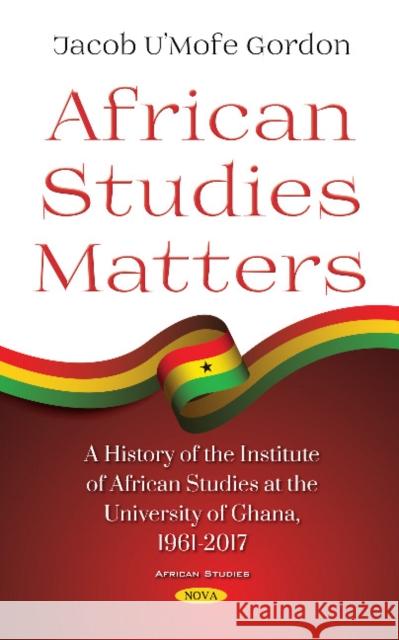African Studies Matters: A History of the Institute of African Studies at the University of Ghana, 1961-2017 » książka
African Studies Matters: A History of the Institute of African Studies at the University of Ghana, 1961-2017
ISBN-13: 9781536146080 / Angielski / Twarda / 2019 / 209 str.
African Studies Matters: A History of the Institute of African Studies at the University of Ghana, 1961-2017
ISBN-13: 9781536146080 / Angielski / Twarda / 2019 / 209 str.
(netto: 1007,71 VAT: 5%)
Najniższa cena z 30 dni: 1027,57 zł
ok. 22 dni roboczych.
Darmowa dostawa!
This book provides the conceptual framework for documenting the history of the Institute of African Studies at the University of Ghana, West Africa. The Institute was established in 1961 by Dr. Kwame Nkrumah, the first president of the newly independent nation of Ghana. It was the first Institute of African Studies (IAS) at a major university in Sub-Saharan Africa. Nkrumahs vision was to incorporate national development into the mission of educational institutions in Ghana and throughout Africa. The role of African Studies was to provide direction through research, knowledge production and applications for development. This book begins with two historical contexts: (1) the global context, and (2) the establishment of the University of Ghana, formerly the University College of the Gold Coast, which was founded in 1948. This book relies heavily on archival materials at the Institute, the University Archive, and interviews with many of the architects and Directors of the Institute, as well as faculty, students, alumni, and others who contributed to and were impacted by the Institute for more than 50 years. This book documents key milestones in the history of the Institute from its establishment in 1961; its mission as envisioned by its founder, Dr. Kwame Nkrumah, and his address at the official opening of the Institute on October 25, 1963; the development of research and postgraduate teaching curricula (MA, MPhil, and PhD in African Studies); the incorporation of six credit hours of African Studies courses as a requirement in the curricula of all undergraduate majors at the University of Ghana (current enrollment is 40,000 students); a worldwide recognition of the study of African music and dance through the works of the renowned ethnomusicologist J. H. K. Nketia; the production of Ghanaian leaders on multiple levels in both public and private sectors; the founding of the academic research Journal of Contemporary African Studies; the African Thinkers Program; research focus on African traditional leadership and chieftancy; the establishment of the Kwame Nkrumah Endowed Chair in African Studies funded by the international mining conglomerate AngloGold Ashanti; the development of external linkages with universities on five continents; and the creation of the first continental African Studies Association of Africa (ASAA) in 2013, a major historical achievement that culminated in the International Conference on African Studies at the University of Ghana. Moving forward, the Institute promises to build on its past and present to promote Pan-African Studies for national development in Africa and the African Diaspora; a collaboration with the Global African Studies academic community; the advancement of indigenous African knowledge production; the regeneration of African life, history, and culture; and the study of Qualify of Life in Africa.











